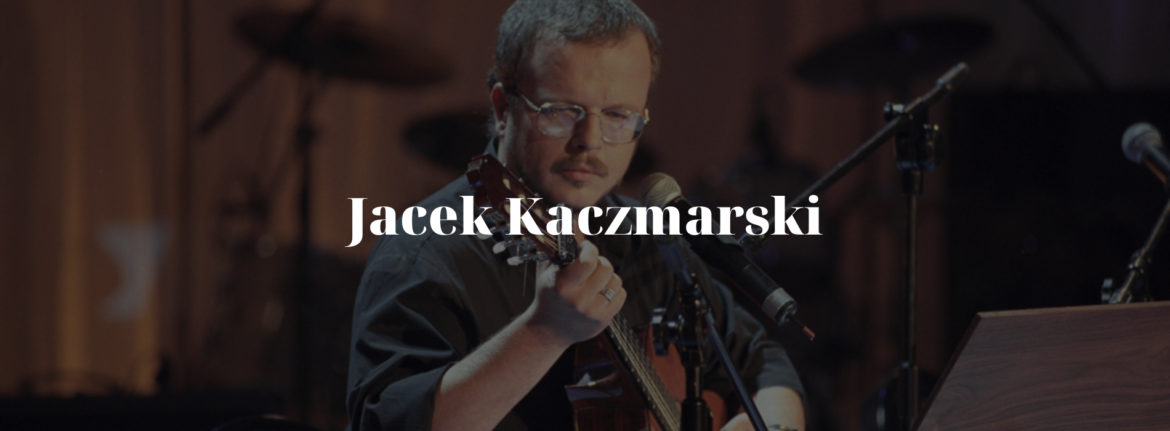Jacek Kaczmarski (1957–2004) remains one of Poland’s most celebrated poets, singers, and songwriters, often referred to as the „Bard of Solidarity.” His deeply evocative lyrics and music became anthems of resistance against communist oppression in Poland, resonating with generations of Poles who yearned for freedom and justice. A master of metaphor and a gifted storyteller, Kaczmarski’s legacy is inseparable from the political and cultural awakening of the 1980s.
Early Life and Artistic Beginnings
Born on 22 March 1957 in Warsaw, Jacek Kaczmarski grew up in a family of artists. His father, Janusz Kaczmarski, was a painter, while his mother, Anna Trojanowska, worked as a graphic artist. Immersed in an intellectually vibrant environment, Kaczmarski developed a passion for literature, music, and history from an early age.
He studied Polish philology at the University of Warsaw, where he became involved in student theatre and began writing poetry. Early influences included Russian bard Vladimir Vysotsky, whose socially and politically charged songs inspired Kaczmarski’s own artistic direction. Kaczmarski’s deep understanding of history and his keen observation of contemporary events gave his work a timeless, universal appeal.
In the late 1970s, Kaczmarski gained national recognition with performances at student festivals and through his association with the Piwnica pod Baranami cabaret in Kraków. His songs, blending poetic lyrics with acoustic guitar, stood out for their intensity and intellectual depth.
The Voice of Resistance
Kaczmarski rose to prominence with his 1978 song Mury („Walls”), inspired by Vysotsky’s L’Estaca. Though originally written as a lament on human limitations in the face of oppression, Mury was adopted by the Solidarity movement as an anthem of defiance. Its refrain, „A mury runą, runą, runą…” („And the walls will fall, fall, fall…”), became a rallying cry for freedom.
Through the late 1970s and early 1980s, Kaczmarski produced a series of songs that captured the struggles, fears, and hopes of Poles living under communist rule. Tracks like Obława („The Wolf Hunt”), Zbroja („The Armour”), and Sen Katarzyny II („Catherine II’s Dream”) used historical and allegorical themes to critique authoritarianism, censorship, and moral corruption. His ability to weave history with contemporary struggles earned him the reputation of a „bard of the oppressed.”
Exile and International Activism
Following the declaration of martial law in Poland in December 1981, Kaczmarski was on tour in France. Unable to return to Poland, he lived in exile for much of the 1980s, primarily in France and later in Germany. During this period, he continued to write and perform, becoming a voice for the Polish diaspora and an advocate for international awareness of Poland’s plight.
While abroad, he collaborated with Radio Free Europe, broadcasting his music and commentary to Poles back home. His songs, smuggled into Poland through underground channels, sustained the spirit of resistance during some of the darkest years of communist rule.
Return to Poland and Later Years
With the fall of communism in 1989, Kaczmarski returned to a transformed Poland. Though he continued to perform and record, the context for his music had changed. No longer a voice of political defiance, his work explored broader themes of personal reflection, existential struggles, and cultural identity.
Kaczmarski also published novels, essays, and poetry, showcasing his versatility as a writer. His intellectual curiosity and love for the arts remained undiminished, and he maintained a strong connection with his audience through live performances and recordings.
In his later years, Kaczmarski faced significant health challenges, including a battle with laryngeal cancer. Despite these struggles, he remained artistically active, continuing to write and inspire until his death on 10 April 2004 in Gdańsk.
Artistic Legacy
Jacek Kaczmarski’s music and poetry transcend the political context in which they were created. His songs continue to resonate as powerful expressions of the human condition, addressing themes of freedom, oppression, resilience, and the search for truth.
- Mury* remains an enduring symbol of resistance and hope, often performed at events commemorating Poland’s fight for democracy. Kaczmarski’s influence extends beyond Poland, as his work has been translated and performed internationally, gaining appreciation for its universal themes and literary richness.
For many Poles, Kaczmarski is more than a cultural icon; he is a symbol of the nation’s enduring spirit. His ability to articulate the struggles and aspirations of his time ensures that his music will remain a vital part of Poland’s cultural heritage for generations to come.
